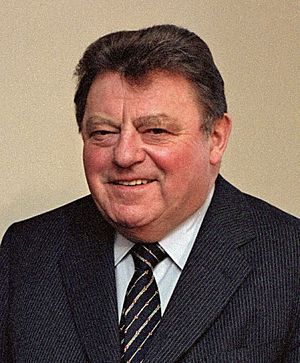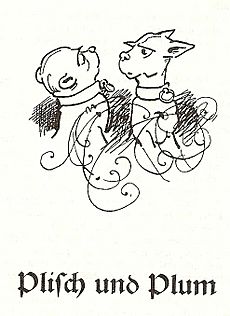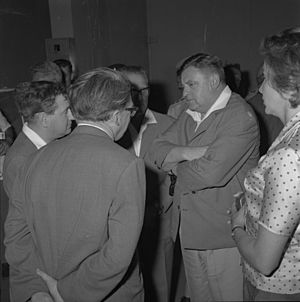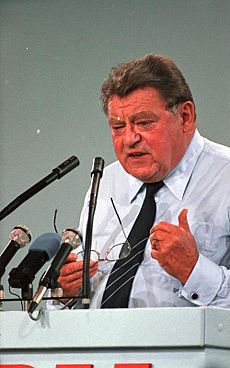Franz Josef Strauss facts for kids
Quick facts for kids
Franz Josef Strauss
|
|||||||||||||||||||||||||||||||||||||||||||||
|---|---|---|---|---|---|---|---|---|---|---|---|---|---|---|---|---|---|---|---|---|---|---|---|---|---|---|---|---|---|---|---|---|---|---|---|---|---|---|---|---|---|---|---|---|---|

Strauss in 1982
|
|||||||||||||||||||||||||||||||||||||||||||||
| Minister-President of Bavaria | |||||||||||||||||||||||||||||||||||||||||||||
| In office 6 November 1978 – 3 October 1988 |
|||||||||||||||||||||||||||||||||||||||||||||
| Deputy |
|
||||||||||||||||||||||||||||||||||||||||||||
| Preceded by | Alfons Goppel | ||||||||||||||||||||||||||||||||||||||||||||
| Succeeded by | Max Streibl | ||||||||||||||||||||||||||||||||||||||||||||
| Leader of the Christian Social Union | |||||||||||||||||||||||||||||||||||||||||||||
| In office 18 March 1961 – 3 October 1988 |
|||||||||||||||||||||||||||||||||||||||||||||
| General Secretary |
|
||||||||||||||||||||||||||||||||||||||||||||
| Preceded by | Hanns Seidel | ||||||||||||||||||||||||||||||||||||||||||||
| Succeeded by | Theo Waigel | ||||||||||||||||||||||||||||||||||||||||||||
|
|||||||||||||||||||||||||||||||||||||||||||||
|
|||||||||||||||||||||||||||||||||||||||||||||
| Personal details | |||||||||||||||||||||||||||||||||||||||||||||
| Born |
Franz Josef Strauß
6 September 1915 Munich, Kingdom of Bavaria, German Empire (now Bavaria, Germany) |
||||||||||||||||||||||||||||||||||||||||||||
| Died | 3 October 1988 (aged 73) Regensburg, Bavaria, West Germany |
||||||||||||||||||||||||||||||||||||||||||||
| Political party | Christian Social Union (1946–1988) | ||||||||||||||||||||||||||||||||||||||||||||
| Spouse | Marianne Zwicknagl | ||||||||||||||||||||||||||||||||||||||||||||
| Children | 3 | ||||||||||||||||||||||||||||||||||||||||||||
| Alma mater | Ludwig Maximilian University of Munich | ||||||||||||||||||||||||||||||||||||||||||||
| Occupation |
|
||||||||||||||||||||||||||||||||||||||||||||
| Signature |  |
||||||||||||||||||||||||||||||||||||||||||||
Franz Josef Strauss (born September 6, 1915 – died October 3, 1988) was an important German politician. He led the Christian Social Union in Bavaria (CSU) for many years, from 1961 to 1988. He also served as a minister in the German government from 1953 to 1969. Later, he became the minister-president (leader) of the German state of Bavaria from 1978 until his death in 1988. Strauss is also known for helping to create the European aerospace company Airbus.
After the 1969 national elections, the CDU/CSU political group lost power for the first time. At this point, Strauss focused more on the politics of Bavaria. He ran for the top job of Chancellor in 1980 but did not win. After that, he never held a national government position again. From 1978 until he passed away in 1988, he was the head of the Bavarian government. His last two decades were marked by a strong rivalry with Helmut Kohl, who led the CDU party.
Contents
- Early Life and Education
- Military Service in World War II
- Starting His Political Career
- The Spiegel Affair
- Working with Karl Schiller
- Rivalry with Helmut Kohl
- Supporting European Unity
- Helping Create Airbus
- Leader of Bavaria
- Visit to Albania
- Death
- Family Life
- His Legacy and Impact
- Images for kids
- Early Life and Education
- Military Service in World War II
- Starting His Political Career
- The Spiegel Affair
- Working with Karl Schiller
- Rivalry with Helmut Kohl
- Supporting European Unity
- Helping Create Airbus
- Leader of Bavaria
- Visit to Albania
- Death
- Family Life
- His Legacy and Impact
- Images for kids
- See also
Early Life and Education
Franz Josef Strauss was born in Munich on September 6, 1915. His father was a butcher. From 1935 to 1939, he studied German language, history, and economics at the Ludwig Maximilian University of Munich.
Military Service in World War II
During World War II, Strauss served in the German army, called the Wehrmacht. He fought on both the Western and Eastern Fronts. While on leave, he passed exams to become a teacher. In early 1943, he suffered from severe frostbite on the Eastern Front. After that, he worked as an officer responsible for educating troops at an antiaircraft artillery school. By the end of the war, he was an Oberleutnant (a military rank).
Starting His Political Career
After World War II ended in 1945, the U.S. Army asked Strauss to work as a translator. Soon after the war, he started using his middle name, Josef, in addition to Franz.
In 1945, the American military government appointed him as a deputy leader in Schongau. He also helped create the local branch of the Christian Social Union in Bavaria (CSU) party. Strauss became a member of the first German Parliament, called the Bundestag, in 1949.
In 1953, Strauss became a Federal Minister for Special Affairs. This was in the government led by Chancellor Konrad Adenauer. In 1955, he became the Federal Minister of Nuclear Energy. Then, in 1956, he was made Defence Minister. His job was to build up West Germany's new defense forces, the Bundeswehr. He was the youngest person to hold this important position at the time. In 1961, he became the chairman of the CSU party.
The Spiegel Affair
In 1962, Strauss had to resign as Defence Minister because of the Spiegel affair. Der Spiegel magazine, led by Rudolf Augstein, published information about German defense that Strauss's department said was top secret. Augstein was arrested at Strauss's request and held for 103 days.
This event caused a big political crisis. Five ministers from another party resigned, demanding that Strauss be removed from his position. Chancellor Adenauer was also at risk. Strauss had to admit that he had not been fully truthful to the parliament, and he was forced to resign. However, the courts later cleared him of any charges of acting against the constitution.
Working with Karl Schiller
Strauss became the Minister of the Treasury again in 1966. He worked with Karl Schiller, who was the economy minister from the SPD. Together, they created an important economic plan to help the country's finances. Even though they looked very different and came from different political backgrounds, people jokingly called them Plisch und Plum. This was the name of two dogs in an old cartoon.
Rivalry with Helmut Kohl
In 1969, the SPD party was able to form a government without the conservative parties. Strauss became a strong critic of Willy Brandt's Ostpolitik, which aimed to improve relations with Eastern European countries.
After Helmut Kohl did not win the election for chancellor in 1976, Strauss decided to end the alliance between the CDU and CSU parties in the Bundestag. He changed his mind months later when the CDU threatened to start their own party in Bavaria, where the CSU was the main conservative party.
In the 1980 national election, the CDU/CSU chose Strauss as their candidate for chancellor. Strauss had often criticized Kohl's leadership. Many people thought the CDU believed that Helmut Schmidt of the SPD would win anyway, so they had nothing to lose by letting Strauss run. Schmidt did win. This victory made Kohl's supporters feel that their leader was the right choice. Even though the rivalry between Kohl and Strauss continued for years, Kohl became chancellor in 1982 when the CDU/CSU came back to power. Kohl remained chancellor long after Strauss's death.
Supporting European Unity
Franz Josef Strauss wrote a book called The Grand Design. In this book, he shared his ideas on how Europe could become more united in the future.
Helping Create Airbus
Strauss was very interested in aerospace. He played a key role in creating Airbus in the 1970s. He was the chairman of Airbus in the late 1980s until he died in 1988. Just before his death, he saw Airbus win a big contract to provide planes to Air Canada. Munich's new airport, the Franz Josef Strauß Airport, was named after him in 1992.
Leader of Bavaria
From 1978 until his death in 1988, Strauss was the Minister-President of Bavaria. He also served as the president of the German Bundesrat (a council of German states) from 1983 to 1984. After losing the 1980 national election, he focused on Bavarian politics. He often criticized Kohl's policies, even after Kohl became chancellor.
In 1983, Strauss was mainly responsible for arranging a loan of 3 billion Deutsche Marks to East Germany. This decision was unusual because it went against the long-standing policy of the CSU/CDU, which was to let the East German economy struggle. Many people criticized this move. A political party called The Republicans even formed because of this disagreement.
Strauss was also a strong supporter of the Bavarian monarchy.
Visit to Albania
On August 21, 1984, Strauss visited communist Albania. At that time, Enver Hoxha, who had ruled Albania since World War II, was still in power. Strauss was one of the very few Western leaders to visit Albania in decades, as the country was very isolated. This visit led to talks that Strauss might be preparing the way for diplomatic relations between Albania and West Germany. Indeed, relations were established in 1987.
In 2017, Strauss was honored with the Albanian National Flag Order. There is also a city square named after him in Tirana, Albania.
Death
On October 1, 1988, Franz Josef Strauss collapsed while hunting with a friend near Regensburg. He died in a Regensburg hospital on October 3, 1988, at the age of 73, without waking up.
Family Life
Strauss married Marianne Zwicknagl in 1957. Sadly, she died in a car accident in 1984. They had three children: Maximilan Josef, Franz Georg, and Monika. Monika later became a member of the Bavarian Parliament and a Bavarian minister. In 2009, she was elected to the European Parliament.
His Legacy and Impact
Franz Josef Strauss greatly influenced Bavaria after World War II. He was a strong leader for conservatives and a very skilled speaker. His outspoken right-wing political views made him a strong opponent of more moderate politicians and the political left. He was also connected to several big scandals, which made some politicians keep their distance from him.
However, his policies helped change Bavaria from a farming state into one of Germany's leading industrial areas. Today, Bavaria is one of the wealthiest regions in Germany, partly thanks to his efforts.
Images for kids
|
Franz Josef Strauss
|
|||||||||||||||||||||||||||||||||||||||||||||
|---|---|---|---|---|---|---|---|---|---|---|---|---|---|---|---|---|---|---|---|---|---|---|---|---|---|---|---|---|---|---|---|---|---|---|---|---|---|---|---|---|---|---|---|---|---|

Strauss in 1982
|
|||||||||||||||||||||||||||||||||||||||||||||
| Minister-President of Bavaria | |||||||||||||||||||||||||||||||||||||||||||||
| In office 6 November 1978 – 3 October 1988 |
|||||||||||||||||||||||||||||||||||||||||||||
| Deputy |
|
||||||||||||||||||||||||||||||||||||||||||||
| Preceded by | Alfons Goppel | ||||||||||||||||||||||||||||||||||||||||||||
| Succeeded by | Max Streibl | ||||||||||||||||||||||||||||||||||||||||||||
| Leader of the Christian Social Union | |||||||||||||||||||||||||||||||||||||||||||||
| In office 18 March 1961 – 3 October 1988 |
|||||||||||||||||||||||||||||||||||||||||||||
| General Secretary |
|
||||||||||||||||||||||||||||||||||||||||||||
| Preceded by | Hanns Seidel | ||||||||||||||||||||||||||||||||||||||||||||
| Succeeded by | Theo Waigel | ||||||||||||||||||||||||||||||||||||||||||||
|
|||||||||||||||||||||||||||||||||||||||||||||
|
|||||||||||||||||||||||||||||||||||||||||||||
| Personal details | |||||||||||||||||||||||||||||||||||||||||||||
| Born |
Franz Josef Strauß
6 September 1915 Munich, Kingdom of Bavaria, German Empire (now Bavaria, Germany) |
||||||||||||||||||||||||||||||||||||||||||||
| Died | 3 October 1988 (aged 73) Regensburg, Bavaria, West Germany |
||||||||||||||||||||||||||||||||||||||||||||
| Political party | Christian Social Union (1946–1988) | ||||||||||||||||||||||||||||||||||||||||||||
| Spouse | Marianne Zwicknagl | ||||||||||||||||||||||||||||||||||||||||||||
| Children | 3 | ||||||||||||||||||||||||||||||||||||||||||||
| Alma mater | Ludwig Maximilian University of Munich | ||||||||||||||||||||||||||||||||||||||||||||
| Occupation |
|
||||||||||||||||||||||||||||||||||||||||||||
| Signature |  |
||||||||||||||||||||||||||||||||||||||||||||
Franz Josef Strauss (born September 6, 1915 – died October 3, 1988) was an important German politician. He led the Christian Social Union in Bavaria (CSU) for many years, from 1961 to 1988. He also served as a minister in the German government from 1953 to 1969. Later, he became the minister-president (leader) of the German state of Bavaria from 1978 until his death in 1988. Strauss is also known for helping to create the European aerospace company Airbus.
After the 1969 national elections, the CDU/CSU political group lost power for the first time. At this point, Strauss focused more on the politics of Bavaria. He ran for the top job of Chancellor in 1980 but did not win. After that, he never held a national government position again. From 1978 until he passed away in 1988, he was the head of the Bavarian government. His last two decades were marked by a strong rivalry with Helmut Kohl, who led the CDU party.
Early Life and Education
Franz Josef Strauss was born in Munich on September 6, 1915. His father was a butcher. From 1935 to 1939, he studied German language, history, and economics at the Ludwig Maximilian University of Munich.
Military Service in World War II
During World War II, Strauss served in the German army, called the Wehrmacht. He fought on both the Western and Eastern Fronts. While on leave, he passed exams to become a teacher. In early 1943, he suffered from severe frostbite on the Eastern Front. After that, he worked as an officer responsible for educating troops at an antiaircraft artillery school. By the end of the war, he was an Oberleutnant (a military rank).
Starting His Political Career
After World War II ended in 1945, the U.S. Army asked Strauss to work as a translator. Soon after the war, he started using his middle name, Josef, in addition to Franz.
In 1945, the American military government appointed him as a deputy leader in Schongau. He also helped create the local branch of the Christian Social Union in Bavaria (CSU) party. Strauss became a member of the first German Parliament, called the Bundestag, in 1949.
In 1953, Strauss became a Federal Minister for Special Affairs. This was in the government led by Chancellor Konrad Adenauer. In 1955, he became the Federal Minister of Nuclear Energy. Then, in 1956, he was made Defence Minister. His job was to build up West Germany's new defense forces, the Bundeswehr. He was the youngest person to hold this important position at the time. In 1961, he became the chairman of the CSU party.
The Spiegel Affair
In 1962, Strauss had to resign as Defence Minister because of the Spiegel affair. Der Spiegel magazine, led by Rudolf Augstein, published information about German defense that Strauss's department said was top secret. Augstein was arrested at Strauss's request and held for 103 days.
This event caused a big political crisis. Five ministers from another party resigned, demanding that Strauss be removed from his position. Chancellor Adenauer was also at risk. Strauss had to admit that he had not been fully truthful to the parliament, and he was forced to resign. However, the courts later cleared him of any charges of acting against the constitution.
Working with Karl Schiller
Strauss became the Minister of the Treasury again in 1966. He worked with Karl Schiller, who was the economy minister from the SPD. Together, they created an important economic plan to help the country's finances. Even though they looked very different and came from different political backgrounds, people jokingly called them Plisch und Plum. This was the name of two dogs in an old cartoon.
Rivalry with Helmut Kohl
In 1969, the SPD party was able to form a government without the conservative parties. Strauss became a strong critic of Willy Brandt's Ostpolitik, which aimed to improve relations with Eastern European countries.
After Helmut Kohl did not win the election for chancellor in 1976, Strauss decided to end the alliance between the CDU and CSU parties in the Bundestag. He changed his mind months later when the CDU threatened to start their own party in Bavaria, where the CSU was the main conservative party.
In the 1980 national election, the CDU/CSU chose Strauss as their candidate for chancellor. Strauss had often criticized Kohl's leadership. Many people thought the CDU believed that Helmut Schmidt of the SPD would win anyway, so they had nothing to lose by letting Strauss run. Schmidt did win. This victory made Kohl's supporters feel that their leader was the right choice. Even though the rivalry between Kohl and Strauss continued for years, Kohl became chancellor in 1982 when the CDU/CSU came back to power. Kohl remained chancellor long after Strauss's death.
Supporting European Unity
Franz Josef Strauss wrote a book called The Grand Design. In this book, he shared his ideas on how Europe could become more united in the future.
Helping Create Airbus
Strauss was very interested in aerospace. He played a key role in creating Airbus in the 1970s. He was the chairman of Airbus in the late 1980s until he died in 1988. Just before his death, he saw Airbus win a big contract to provide planes to Air Canada. Munich's new airport, the Franz Josef Strauß Airport, was named after him in 1992.
Leader of Bavaria
From 1978 until his death in 1988, Strauss was the Minister-President of Bavaria. He also served as the president of the German Bundesrat (a council of German states) from 1983 to 1984. After losing the 1980 national election, he focused on Bavarian politics. He often criticized Kohl's policies, even after Kohl became chancellor.
In 1983, Strauss was mainly responsible for arranging a loan of 3 billion Deutsche Marks to East Germany. This decision was unusual because it went against the long-standing policy of the CSU/CDU, which was to let the East German economy struggle. Many people criticized this move. A political party called The Republicans even formed because of this disagreement.
Strauss was also a strong supporter of the Bavarian monarchy.
Visit to Albania
On August 21, 1984, Strauss visited communist Albania. At that time, Enver Hoxha, who had ruled Albania since World War II, was still in power. Strauss was one of the very few Western leaders to visit Albania in decades, as the country was very isolated. This visit led to talks that Strauss might be preparing the way for diplomatic relations between Albania and West Germany. Indeed, relations were established in 1987.
In 2017, Strauss was honored with the Albanian National Flag Order. There is also a city square named after him in Tirana, Albania.
Death
On October 1, 1988, Franz Josef Strauss collapsed while hunting with a friend near Regensburg. He died in a Regensburg hospital on October 3, 1988, at the age of 73, without waking up.
Family Life
Strauss married Marianne Zwicknagl in 1957. Sadly, she died in a car accident in 1984. They had three children: Maximilan Josef, Franz Georg, and Monika. Monika later became a member of the Bavarian Parliament and a Bavarian minister. In 2009, she was elected to the European Parliament.
His Legacy and Impact
Franz Josef Strauss greatly influenced Bavaria after World War II. He was a strong leader for conservatives and a very skilled speaker. His outspoken right-wing political views made him a strong opponent of more moderate politicians and the political left. He was also connected to several big scandals, which made some politicians keep their distance from him.
However, his policies helped change Bavaria from a farming state into one of Germany's leading industrial areas. Today, Bavaria is one of the wealthiest regions in Germany, partly thanks to his efforts.
Images for kids
See also
 In Spanish: Franz Josef Strauß para niños
In Spanish: Franz Josef Strauß para niños





